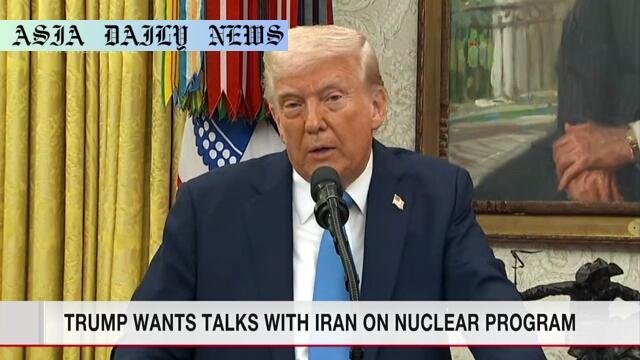Iran nuclear talks remain critical, with US President Trump seeking discussions to resolve the issue of nuclear weapons proliferation.

Introduction: The Reignited Focus on Iran’s Nuclear Talks
The issue of Iran’s nuclear weapons program has once again taken center stage in global discourse, with US President Donald Trump advocating for new talks to address this pressing challenge. After a letter was sent to Iran’s Supreme Leader Ayatollah Ali Khamenei urging negotiation, public and diplomatic attention has turned to the possibility of resolution. Trump’s preference to ‘work it out with Iran’ signals his administration’s interest in re-establishing dialogue, following the tumultuous withdrawal of the US from the prior nuclear agreement in 2018.
However, history shows that restoring such conversations is fraught with complexities, given the failure of the Biden administration’s attempts at indirect negotiations. Current efforts seem to hinge on indirect talks mediated by a neutral third party, highlighting both the difficulty and the geopolitical sensitivity surrounding Iran’s nuclear ambitions.
The Past and Present of US-Iran Relations on Nuclear Agreements
The antagonism between the US and Iran regarding nuclear proliferation is not new. The Joint Comprehensive Plan of Action (JCPOA), also known as the Iran Nuclear Deal formed during the Obama administration, aimed to curtail and monitor Iran’s enrichment activities. It was lauded internationally as a pivotal move towards non-proliferation. However, in 2018, Trump’s unilateral withdrawal from the agreement created a diplomatic vacuum, escalating tensions significantly.
Today, the situation remains starkly divided. The former Biden administration made several attempts to coerce Iran back into compliance with indirect talks and sanctions relief as potential leverage. Nonetheless, these negotiations failed, lacking the consensus or trust required for concrete action. Trump’s new push for dialogue marks an intriguing shift in strategy but raises concerns over its feasibility, especially amidst enduring mistrust and regional upheaval in the Middle East.
The Stakeholders and Geopolitical Significance
Iran’s nuclear program has ramifications that extend far beyond its borders, targeting the heart of regional and international stability. For one, key allies like Israel and Saudi Arabia view a nuclear-capable Iran as an existential threat, consistently lobbying US administrations for tough measures. Conversely, adversaries such as Russia and China critique Western interference, citing sovereignty and the dual standards of nuclear policy globally.
The stakes are equally high for Iran, which considers its nuclear ambitions a critical component of national security and technological advancement. While sanctions have paralyzed its economy, they’ve also steeled Tehran’s resolve to negotiate terms that preserve its dignity and strategic autonomy.
The Path Forward: Hope Amidst Uncertainty
Whether these talks can change the complex dynamics between the US and Iran remains to be seen. If a neutral third party can broker dialogue, as hinted by Iran’s Foreign Minister Abbas Araghchi, a foundation for trust could emerge. Such trust would pave the way for discussions about not only nuclear weapons but also a broader rethinking of US-Iran relations.
The renewed interest in these talks carries headwinds of skepticism, yet also underscores the necessity of diplomacy in defusing potential conflict. A successful negotiation wouldn’t just curb Iran’s nuclear activities; it might stabilize a volatile region and bolster global non-proliferation efforts for years to come.
Commentary
The Importance of Reigniting Communication
The global response to renewed discussions on Iran’s nuclear program is a reminder of diplomacy’s fragility and importance. Iran’s nuclear ambitions, coupled with external pressures, have historically made for a tense equilibrium. This underlying tension underscores the need for persistent dialogue, even in the face of setbacks.
Trump’s call for talks is a step in the right direction, though it does not erase earlier missteps, such as the withdrawal from the JCPOA. That move not only isolated the US diplomatically but also emboldened Iran to pursue uranium enrichment without the constraints of international oversight. By pushing for a fresh round of negotiations, the US has an opportunity to rectify past mistakes while addressing legitimate concerns about nuclear proliferation.
Challenges in the Path Ahead
Nonetheless, this path forward is fraught with complications. Distrust on both sides is deep, exacerbated by decades of rhetoric and accusations that have vilified the other party. Iran will likely demand significant concessions, such as the lifting of sanctions or acknowledgment of its right to civilian nuclear energy. Meanwhile, the US must reassure its allies of its commitment to their security and regional stability.
The prospect of third-party mediation adds another layer of complexity but also opportunity. Neutral countries or organizations could build bridges where direct communication has failed. However, finding a mediator acceptable to both parties may be an intricate task.
Final Thoughts: Diplomacy as the Only Viable Path
Ultimately, these developments are an invitation for the world to revisit the power of diplomacy. Solutions to complex international issues such as nuclear disarmament won’t be perfect or immediate, but they are necessary to avoid escalation. As the spotlight returns to US-Iran relations, one can only hope this chapter will bring progress, not further discord.


